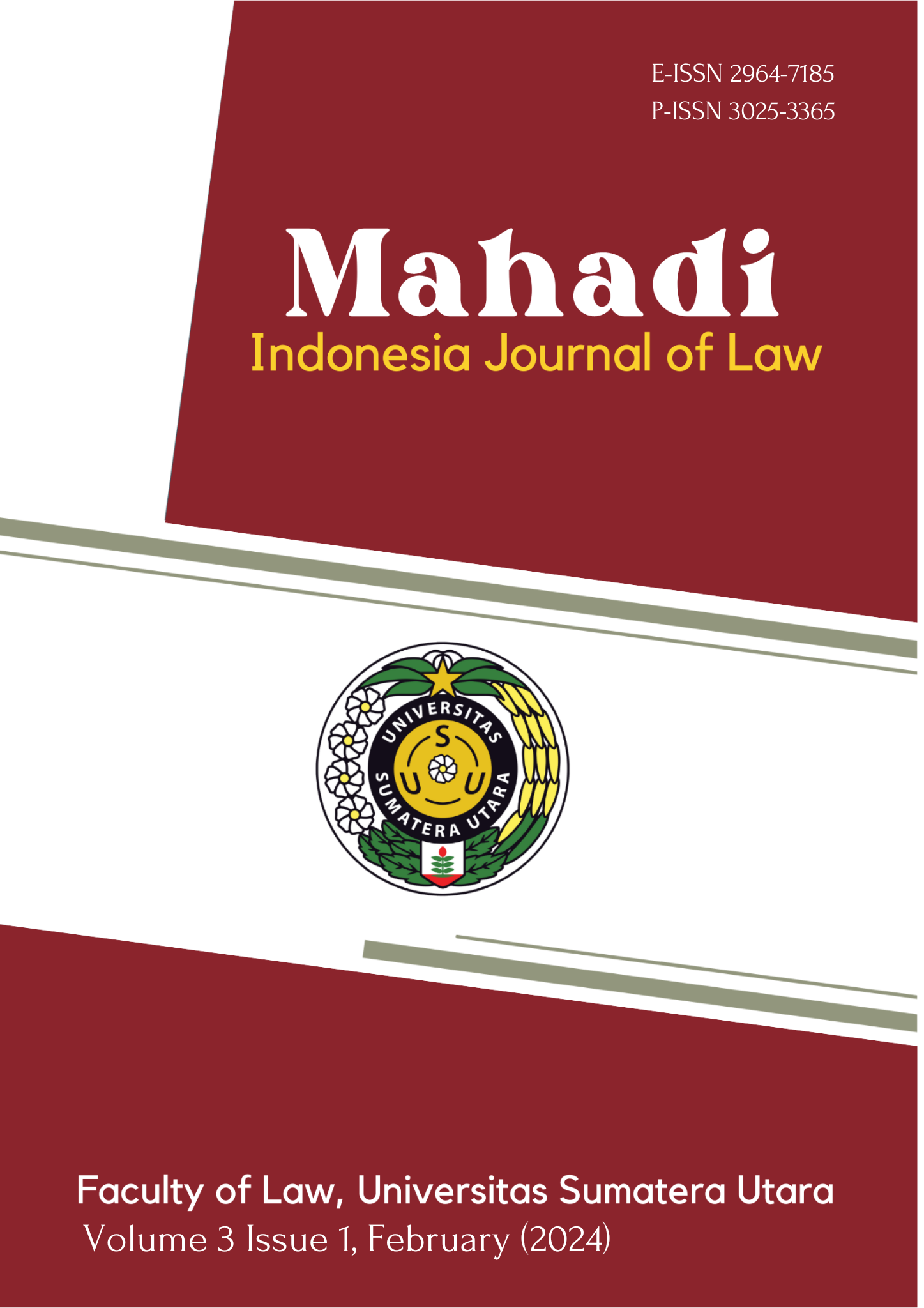The Role of Victimology in the Protection of Crime Victims in Indonesian Criminal Justice System
DOI:
https://doi.org/10.32734/mah.v3i01.15379Keywords:
Victimology, Protection of Crime Victims, Indonesian Criminal Justice System.Abstract
Crime victims often find themselves in a consistently disadvantaged position, suffering physically, psychologically, and materially due to the crimes they endure. Unfortunately, the state's attention to victims lacks the intensity given to criminals, with a predominant focus on the legal position and human rights of offenders. Striking a balance between justice for perpetrators and protection for victims is essential. Presently, victims are predominantly considered supplementary to the sufferer, serving as witnesses solely to establish the guilt of the perpetrator. This research uses legal normative methods and employs a descriptive-analytical approach to explore victim guarantees in the Indonesian criminal justice system. The study scrutinizes statutory regulations, emphasizing the role of victimology in safeguarding crime victims. Historically, victim protection primarily centered on the right to compensation. However, Law Number 13 of 2006 concerning Witness and Victim Protection, in conjunction with Law Number 31 of 2014 concerning Amendments to Law Number 13 of 2006 concerning Witness and Victim Protection, significantly expanded victims' rights. Despite this progress, the integration of victim rights into the criminal justice system remains incomplete. The Indonesian criminal justice system must prioritize and safeguard victims' interests, acknowledging the crucial role of victimology in advocating for the rights of those harmed by perpetrators.
Downloads
References
Ali, Mahrul and Wibowo, Ari, "Compensation and Restitution Oriented to Victims of Crime", Juridika, Volume 33, No. 2, May 2018.
Atmasasmita, Romli, Criminal Justice System (Perspective of Existentialism and Abolitionism), Bandung: Binabuat, 1996.
Boyle, David, “The Rights of Victims: Participation, Representation, Protection, Reparationâ€, Journal of International Criminal Justice, Volume 4, 2, 2006.
Chinedu Olugbuo, Benson and Mukundi Wachira, George, “Enchancing the Protection of the Rights of Victims of International Crimes: A Model for East Africaâ€, African Human Rights Law Journal, 11, 2011.
Criminal Code (KUHP).
E. Barnett, Randy and Hegel, John III, edts., Assessing The Criminal: Restitution, Retribution, and the Legal Process, Cambridge: Ballinger Publishing Company, 1977.
E. Gegan, Susan, Ernesto Rodriguez, Nicholas, “Victims' Roles in the Criminal Justice System: A Fallacy of Victim Empowerment?â€, Saint John's Journal of Legal Commentary, 1992.
Ellen Polito, Karyn, “The Rigths of Crime Victims in the Criminal Justice System: Is Justice Blind to the Victims of Crime?â€, New England Journal on Criminal and Civil Confinement, 1990.
Gosita, Arif, Problems of Crime Victims Collection of Essays, Jakarta: PT Bhuana Ilmu Popular, 2004.
Government Regulation Number 3 of 2002 on Compensation, Restitution and Rehabilitation for Victims of Serious Human Rights Violations.
Government Regulation Number 7 of 2018 on Providing Compensation, Restitution and Assistance to Witnesses and Victims.
Hamzah, Andi, Protection of Human Rights in the Criminal Procedure Code, Bandung: Binabuat, 1986.
Hermintadi, Tri, Victims' Interests in the Criminal Justice System from a Victimological Perspective, Jakarta: Badilag, 2009.
Indah, Maya, Victim Protection, a Perspective on Victimology and Criminology, Second Edition, Jakarta: Kencana Prenada Media Group, 2014.
Kenedi, John, Protection of Witnesses and Victims (Study of the Legal Protection of Crime Victims in the Judicial System in Indonesia), Yogyakarta: Pustaka Belajar, 2020.
Law Number 11 of 2012 on the Juvenile Justice System.
Law Number 15 of 2003 on Eradication of Criminal Acts of Terrorism.
Law Number 21 of 2007 on Eradication of the Crime of Human Trafficking.
Law Number 23 of 2004 on the Elimination of Domestic Violence (UU PKDRT).
Law Number 26 of 2000 on Human Rights Courts.
Law Number 31 of 2014 on amendments to Law Number 13 of 2006 on Protection of Witnesses and Victims.
Law Number 8 of 1981 on Criminal Procedure Law (KUHAP).
Law Number 8 of 2010 on Prevention and Eradication of the Crime of Money Laundering.
Lugianto, Adil, "Reconstruction of the Protection of the Rights of Crime Victims", MMH Journal, Volume 43, No. 4, October 2014.
M. Arief Mansyur, Didik and Gultom, Elisatris, The Urgency of Crime Victim Protection: Between Norms and Reality, Jakarta: PT. RajaGrafindo Persada, 2008.
Margaret Gianni, Mary, “The Procreative Power of Dignity: Dignity's Evolution in the Victims Rights Movement,†Drexel Law Review, 9, 2016.
Meliala, Adrianus, Reparations and Compensation for Victims in Restorative Justice, Jakarta: Witness and Victim Protection Institute and Department of Criminology, FISIP UI, 2011.
Mudzakkir, "The Legal Position of Crime Victims in the Criminal Justice System", Inaugural Dissertation for Professor at the University of Indonesia, April 6 2001.
Mudzakkir, "The Position of Crime Victims in the Indonesian Criminal Justice System Based on the Criminal Code and Draft Criminal Code", Journal of Legal Sciences, Volume 14, No. 1, March 2011.
Muladi and Arief, Barda Nawawi, Anthology of Criminal Law, Bandung: PT Alumni, 1992.
Muladi and Nawawi Arief, Barda, Criminal Theories and Policies, Bandung: Alumni, 1984.
Muladi, Collection of Essays on Political Human Rights and the Criminal Justice System, Semarang: Diponegoro University, 1997.
Muladi, Human Rights, Politics and the Criminal Justice System, Semarang: BP Undip, 1997.
Muladi, Human Rights: Essence, Concept and Implications from the Perspective of Law and Society, Bandung: Refika Aditama, 2005.
Mulyadi, Lilik, "Legal Efforts Taken by Crime Victims Examined from the Perspective of the Criminal Justice System in the Decision of the Supreme Court of the Republic of Indonesia", Law Journal, No Year.
Nash, Andrew, “Victims by Definitionâ€, Washington University Law Review, Volume 85, 6, 2008.
Nawawi Arief, Barda, Law Enforcement Issues & Crime Control Policies, Bandung: Citra Aditya Bakti, 2001.
Nizarli, Riza, "The Position of Crime Victims in the Criminal Justice System in Indonesia", Journal of Canon Law, ISSN 0854-5499, December 1993.
Paul Separovic, Zvonimir, Victimology, Zegreb: Studies of Victims, 1985.
Rai Yuliartni, Ni Putu, "The Position of Crime Victims in the Criminal Justice System in Indonesia Based on the Criminal Procedure Code (KUHAP)", Legal Communication Journal, Volume 1, Number 1, ISSN: 2356-4164, February 2015.
Sahetapy, JE, Victimology of an Anthology, Jakarta: Pustaka Sinar Harapan, 1987.
Soeparman, H. Parman, Legal Regulations for Proposing Judicial Review in Criminal Cases for Crime Victims, Bandung: Refika Aditama, 2007.
Sura Priambada, Non-Commissioned Officer, "Victimology in the Criminal Justice System Regarding the Interests of Victims", Legal Articles, n.d.
The 1945 Constitution of the Republic of Indonesia.
Triana Masania, Alen, "The Position of Crime Victims in the Criminal Justice System", Lex Crimen, Vol. IV/No.7/September/2015.
Van Boven, Theo, Those Who Become Victims, Jakarta: Elsam, 2002.
Waluyo, Bambang, Victimology of Victim and Witness Protection, Jakarta: Sinar Graphics, 2011.
Yulia, Rena, Victimology, Legal Protection for Crime Victims, Yogyakarta: Graha Ilmu, 2010.
Downloads
Published
How to Cite
Issue
Section
License
Copyright (c) 2024 Edi Yunara, Taufik Kemas

This work is licensed under a Creative Commons Attribution-ShareAlike 4.0 International License.











